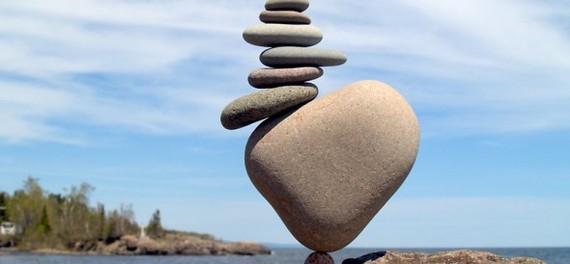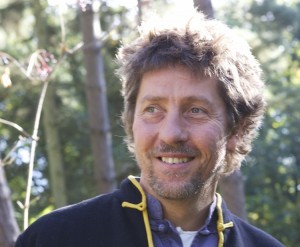Are you going to skim this blog, rather than take time to calmly read it? Probably. That's what most of us do these days. We get the gist, rather than imbibe the essence. We try to fit as much as possible into our day, we spread ourselves thin bouncing from one thing to the other, meanwhile holding out for that peak experience -- that trip to Mexico, swimming with a whale, or getting the latest GoPro. Then, the dull ache of dissatisfaction begins to implant itself in us; we feel unfulfilled, in despair even, and we're left grasping for something else that we think might soothe our mind...
We have become stimulation addicted. Could our increasingly tech-saturated culture be to blame? Our narcissistic smartphone addiction? Possibly. The way we process information, and our experiences more generally, has changed so profoundly in the past few years that there is a real danger that we may lose our ability to extract anything meaningful from many of the things we used to find rewarding and enjoyable.
"At a time when we have more in our lives than we've ever had, the number of people of all ages experiencing a lack of personal meaning and fulfillment is increasing at alarming levels," says Burgs, who has been teaching meditation since 1995 and hosted over 100 retreats.
What about the mindfulness movement? I hear you ask. Isn't that helping...? Indeed mindfulness has become "the new black." Over the past couple of years it has been seeping into the mainstream vernacular (although, ask five people what mindfulness is, and you'll get five different definitions); celebrities and CEOs such as Bill Ford, Rupert Murdoch and Gwyneth Paltrow say they meditate, and there are dozens of mindfulness apps out there. The problem is that, on the whole, the types of programs being offered up aren't really developing our ability to engage or truly relieving us of our restlessness.
Burgs, who resides in England, U.K., and who is one of the most accomplished meditation teachers in the West today, was recently approached to put together a mindfulness and meditation program to help people cope better with the demands of modern life. "How wonderful," he thought, until he heard the detailed brief: "... but you have to be able to do it in no more than 12 minutes a day!" This is the quick fix approach, namely, the most convenient one -- which we apply to pretty much everything these days. It not only caters to our need for instant gratification, it is fueling it! In other words, it's "not just a symptom of the problem, but one of its fundamental causes," says Burgs. "Have no doubt that this [stimulation addiction] will be seriously changing our brain chemistry."
So, while it is encouraging that mindfulness has made its way to the mainstream, as the world recognizes the need to take mental health as seriously as physical health (we are living longer, but chronic stress-induced illnesses are proliferating), Burgs sees a great opportunity being missed.
Mindfulness is the ability to pay (sustained) attention, and meditation helps us develop our ability to concentrate. When practiced with sustained effort and patience, meditation can enrich and transform our lives beyond recognition. "We are only dissatisfied with this extraordinary thing it is to be human, because we don't have the capacity to pay enough attention," says Burgs.
The endeavor to train, or refine, one's mind, can be compared to that which you would need to embark on if you wanted to become physically fit, or to learn and excel in a new sport. If you're untrained, you're not going to get there through occasional spurts of effort. The journey involves sustained effort, patience, and time.
A 12 minute "go" when you ride the subway to work may cultivate some awareness, namely that you're either restless, lazy, fearful, judgmental, easily distracted or unable to concentrate -- but this is only the first step towards doing something about it.
New Yorkers don't slow down for anything! I hear you say. It's true, everything moves espresso-fast. Even if a meteoroid flashing neon lights dropped from the night sky into the path of New Yorker he would keep walking, annoyed that his journey to Duane Reade was made 11 seconds longer.
But clearly we restless lot should be slowing down. "Getting more out of life does not mean fitting more in ... It means investing in ourselves as a human expression of life and finding out what we're really capable of," proffers Burgs.
A great first step to getting more out of life is to simplify your life. Instead of continuing to take on more things, wondering "How can I cope with all of this?" and squeezing in 12 minutes of mindfulness practice into your already frantic schedule, you should be asking yourself, "How can I create some more space? So that I have the energy and time to put into the things that are meaningful to me?"
We also need to understand that, "it doesn't matter what you actually experience- that isn't the cause of your happiness or contentment. It's your capacity to engage in that experience that determines whether it is meaningful or empty or pointless," explains Burgs in his book, The Flavour of Liberation.
Burgs stumbled upon meditation quite by chance. Until his mid 20s, he had been 'a rebel and a dreamer', chasing excitement and adventure. After graduating college he took off to the Swiss Alps and became a ski bum. He set up a ski tour business that he named Ski Mania. His hedonistic lifestyle lead to him coining the tagline, 'Make Madness a Way of Life" which he imprinted on sweat-shirts, and before long, he and his friends were heading a successful fashion business, named "Mad Rags", touring festivals and hosting big parties. The business was raking in the cash and set to go global when Burgs had a deep moment of reflection. His crazy life of revelry flashed before him, and he knew that he was done. He took off to Bali, and it was there that, by chance, he met Merta Ada, the Balinese meditation teacher and healer. That was the first time that, through making an effort to concentrate deeply, he caught a glimpse of the stillness, and the mind's potential. He was inspired about the idea of seeing what the mind could do. He saw that it is about getting more out of the experiences he already had rather than an endless quest for more that he had previously been driven by.
"There is a world of untapped potential hidden within the mind, and the more coherent our mind becomes the more that hidden potential reveals itself. Most of us experience our mind as burdensome and difficult to live with, but if you turn that around to something that's contributing to every aspect of your life, then your whole life can be transformed."
Five years ago a friend encouraged me to go on one of Burgs' week-long silent retreats, and since then he has become the biggest influence in my life. Burgs is by far the best (most accessible, accomplished, inspiring, talented) meditation teacher that I have encountered. And now that I live across the pond, his online programs, insightful writings and stirring discourses are a godsend. A recent article in the Daily Telegraph shows that Burgs has not just changed my life but many others.
If you would like to learn to concentrate deeply, to really pay attention un-distractedly, and get more out of this precious life, then I highly recommend Burgs' series of online courses, which will be starting again on Sept. 20. They ask you to be still long enough (20-30 minutes, five times a week) to actually allow your nerve system to decompress and reorganize. This is the real deal. If more of us could learn to slow down, be still and concentrate, we may be able to connect with what really matters.
All photos courtesy of The Art Of Meditation



